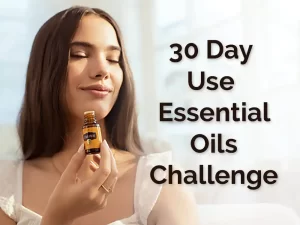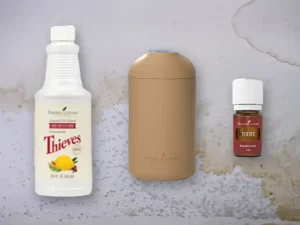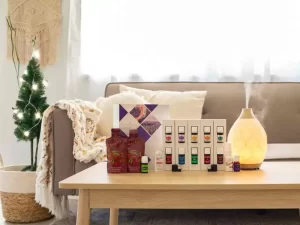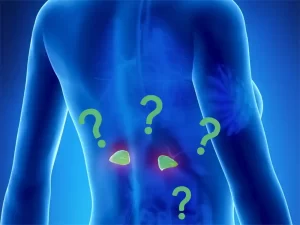Maybe you are new to essential oils and are still learning, or maybe you have been using them for a while and know all that there is to know. However I wanted to share with you some of the things I have found out along the way, that I was doing wrong when it came to using essential oils.
1. Holding the essential oil bottle straight upside down
Did you know that essential oils don’t come out the big hole in the middle of the orifice reducer (clear rubbery thing)? They come out of tiny holes that are in the rim around this. If you take a close look you’ll be able to see the tiny holes it comes out of. The bigger hole is an air vent that actually allows air to go inside the bottle and push the essential oil out. By holding the bottle straight up and down you are blocking the bigger hole off with oil and it will take longer for the essential oil to drip out. Try holding the bottle on a 45 degree angle and if the essential oil is still not coming out then roll the bottle around a little so the tiny hole moves to the bottom and the essential oil comes out more easily. Young Living essential oils are really concentrated, so one drop goes a long way.
2. Putting essential oils straight into your bath water
Oil and water don’t mix. Even though essential oils aren’t actually a fatty oil, they are oil-soluble (also known as non-polar substances), rather than water-soluble (also known as polar substances). Polar substances only dissolve in polar solvents and non-polar substances in non-polar solvents. This is why essential oils won’t disperse throughout the bath water – because the essential oils are non-polar and water is polar. The essential oils will instead float on top, unless you use some sort of surfactant to disperse them through your water. Even Epsom salts, sea salt and bicarb soda are all polar substances, so they will not fully disperse the essential oils through the bath water. A better way to disperse them fully is with a Castile liquid soap or an unscented bath gel, such as the Young Living Bath and Shower Gel.
3. Leaving the lids off your essential oil bottles
Essential oils are what we call volatile substances, which basically means they turn to vapour and will evaporate, particularly if you leave the lids off them. The lighter molecules evaporate faster and it is these constituents that are more gentle on our skin. Hence, if these evaporate then the essential oil can cause redness and irritation. If an essential oil comes into contact with oxygen because the lids are left off, then the process called oxidation begins. Oxidation can affect the quality of the essential oil and lead to possible skin irritation.
4. Leaving essential oils in your car
Essential oils can also oxidise if they are exposed to extreme temperatures such as a hot car. If the essential oil is heating up and then cooling down then the oxidation process speeds up. If an oil oxidises, then it may cause skin irritation or even be rendered unusable. Citrus oils such as Bergamot, Lemon, Lime, Orange, Tangerine and Grapefruit are the most susceptible to this as they are cold-pressed from the rind and not steam-distilled. They can be damaged in temperatures over 38 degrees Celsius. If they have been exposed to extreme heat, then allow them to cool down before opening the lid to avoid some of the lighter molecules evaporating. If they smell different, then it is more than likely they have gone off.
5. Storing your essential oils in anything other than amber glass
Ultraviolet light promotes free radicals. Amber-coloured glass is the best way to keep ultraviolet light out. Good quality steam-distilled essential oils that contain lots of sesquiterpenes last the longest of all essential oils, as the molecules are the largest. While those that contain a lot of monoterpenes, are cold-pressed or are absolutes have the shortest shelf life.
6. Using your pointer finger to dab on the essential oil.
Have you ever got an essential oil in your eye? Let me tell you, it hurts, particularly if it’s a ‘hot’ oil like peppermint or oregano. If you get an essential oil in your eye or anywhere else where it feels like it is burning you, the best thing you can do is to flood the area with a carrier oil such as Olive Oil or Coconut Oil. As mentioned before, water is a polar solvent and it won’t dilute a non-polar substance such as an essential oil. One way to avoid getting an essential oil in your eye is to use your ring or pointer finger to apply the essential oil. You are far more likely to touch your eye with your pointer finger than you are with your ring or pinky finger. I drop essential oils into the palm of my hand, dilute them if need be and then use my finger to apply them where I want. This also avoids my skin coming in direct contact with the top of the oil bottle. I’m not too worried about bacteria transferring from my skin to the bottle as many essential oils have compounds which can combat bacteria, but I do want to reduce the risk of my essential oils oxidising.
7. Eating essential oils without adding them to a fat or carrier oil
This particularly relates to the ‘hot’ oils such as oregano, clove, cinnamon, lemongrass, thyme and ocotea or blends that contain these. These essential oils are called hot oils for a reason. If an essential oil is hot and feels like it is burning, then it can burn the mucous linings in our oesophagus and stomach if we consume them without adding them to a non-polar solvent. I add essential oils to coconut oil, olive oil, other nut oils, butter, cream, coconut cream or even honey. All essential oils have a flash point, which is the heat at which they will evaporate. It is for this reason that you would add essential oils to your dish after you have taken it off the heat or at the very end. When baking cakes and muffins etc, you may need to add extra drops to the mixture as some of the flavour will flash off during the cooking process. Like to get a FREE cooking with oils recipe book?
I hope you have found some of these tips useful. If you have any questions about using essential oils please feel free to contact me through the Hot Oily Mumma Facebook page. If you don’t know then there are probably other people who would like to know too.










 Subscribe to Hot Oily Mumma
Subscribe to Hot Oily Mumma